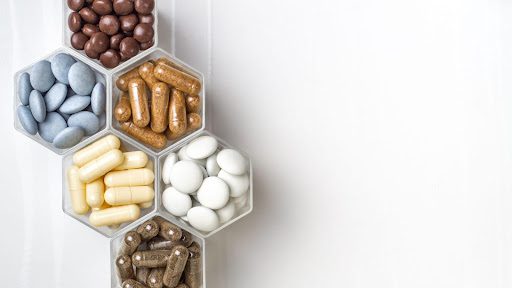When addressing symptoms of depression, natural treatments are often considered as supplemental options. Some evidence supports interventions such as dietary supplements, yoga, or magnetic stimulation as natural treatments for depression, with researchers continuing to evaluate their efficacy. Some of these non-medication therapy options have been proven to give effective symptom relief, especially for treatment-resistant depression.
Read on to learn about the efficacy of natural treatments for depression, such as herbal and dietary supplements. Then review the potential impact of other non-medication therapies, such as exercise, mindfulness-based meditation, and magnetic therapy.

Research has highlighted the importance of nutrition in mental health, making herbal and nutritional interventions potentially therapeutic for depression.
St. John’s wort is a wild-growing plant native to Europe and parts of Asia that has been used as an herbal depression treatment for centuries. However, individuals looking into this treatment have some cautions to consider. Research has shown mixed results for efficacy, with some showing a positive impact on depression symptoms for mild to moderate depression and others showing less or no apparent benefit. A rare but serious build-up of serotonin is possible when St. John’s wort is used with other antidepressants, and it can weaken the effects of many common medications.
Most studies on the use of omega-3 fatty acid supplements for depression symptoms have been adjunctive, meaning that the treatments studied are only used in addition to primary therapies. Omega-3 fatty acids may be consumed as supplements or found in foods such as salmon, tuna, and flaxseeds. Some studies examining the impact of omega-3 supplements show minor positive effects on depressive symptoms. Omega-3 fatty acid supplements are generally well-tolerated with a few minor side effects (digestive upset, fishy aftertaste), but the efficacy and potential as a natural treatment for depression are unclear.
S-adenosyl methionine (SAM-e) is a naturally occurring compound in the body responsible for regulating critical essential cell functions. Studies have shown that a deficiency of SAM-e is associated with depressive disorders, prompting researchers to examine its potential as a natural treatment for depression. Unfortunately, many studies examining potential antidepressant effects of SAM-e have shown little to no symptom improvement when a supplemental form of SAM-e is used. And because high-quality evidence is lacking from the current body of research, the potential of SAM-e as a treatment cannot be determined at this time.
N-acetylcysteine (NAC) is an antioxidant, a substance that counteracts harmful molecules in the body called free radicals. The role of inflammation in mental health disorders has received much attention, and with its anti-inflammatory properties, NAC may have a role as a natural treatment for depression. Multiple studies have shown that NAC improves symptoms and daily functionality for individuals with depressive symptoms. NAC is also well-tolerated with primarily minor side effects such as gastrointestinal upset and back pain.
Vitamin B12 supports the central nervous system in several essential roles, primarily the formation of the protective myelin layer around neurons and in the synthesis of neurotransmitters. Deficiencies with Vitamin B12 have been consistently observed in individuals diagnosed with depression. High doses of daily Vitamin B12 supplementation, between 1000 and 2000 mcg, can reduce depressive symptoms. Supplementation may also support the positive effects of antidepressant medications and delay symptom onset.
Few studies have addressed natural remedies for psychotic depression, and most that have shown no significant impact on depressive symptoms. However, one dietary supplement has shown promise: the amino acid glycine. In fact, when used with antipsychotic medications, glycine was associated with reduced depressive symptoms in four studies and no significant, adverse side effects.

Non-medication treatments are not limited to medicinal herbs and dietary supplements. Physical activity, meditation, and magnetic stimulation are beneficial for depression with no long-term side effects.
Research evidence is somewhat inconsistent about the therapeutic benefits of exercise for individuals with depression. But studies suggest that exercise may be most helpful for mild to moderate depression and is best used as an additional therapy to first-line treatments. And because no harm has been observed when recommending exercise, it may be recommended as part of a comprehensive depression treatment plan.
According to systematic research reviews, yoga may be effective for some as a primary treatment for depression, with benefits similar to medication and exercise. However, evidence shows that yoga is most effective as an adjunct natural treatment for anxiety and depression when used with first-line treatments. However, yoga was less effective than electroconvulsive therapy, a treatment often reserved for treatment-resistant depression.
Mindfulness-based meditation is one of the best natural treatments for depression when addressing symptoms that do not fully meet diagnostic criteria. Limited research evidence shows that mindfulness-based meditation may be effective as a stand-alone treatment for depression. There is more support for their use as an adjunct (additional) treatment for depression or to prevent relapse, with benefits shown to last for six months or more.
Deep Transcranial Magnetic Stimulation (Deep TMS™) is a safe, noninvasive, FDA-cleared treatment for depression, anxious depression, obsessive-compulsive disorder (OCD), and smoking addiction. A medical device embedded in a cushioned helmet delivers targeted magnetic pulses to brain regions associated with psychological symptoms. These stimulating pulses stabilize neural activity, which leads to symptom relief. While some individuals may experience brief side effects shortly after treatment sessions, such as a mild headache near the treatment site, Deep TMS has no long-term adverse effects.
Deep TMS is particularly effective for treatment-resistant depression (TRD), commonly defined by a lack of response to two courses of medication from different drug classes. For example, melancholic depression is a type of TRD marked by low mood, lack of an emotional response to positive circumstances, and worse outcomes. While research on non-medication options is scarce for this subtype, one study showed that TMS was effective as a natural treatment for melancholic depression.
Individuals seeking relief from depression have turned to natural treatments for centuries. Researchers exploring the efficacy of natural treatments for depression are helping to define the role of these traditional treatments in modern times.